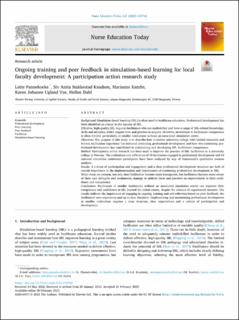| dc.contributor.author | Pannekoeke, Lotte | |
| dc.contributor.author | Sakkestad Knutsen, Siv Anita | |
| dc.contributor.author | Kambe, Marianne | |
| dc.contributor.author | Vae, Karen Johanne Ugland | |
| dc.contributor.author | Dahl, Hellen | |
| dc.date.accessioned | 2023-04-25T06:00:13Z | |
| dc.date.available | 2023-04-25T06:00:13Z | |
| dc.date.created | 2023-04-19T19:13:31Z | |
| dc.date.issued | 2023 | |
| dc.identifier.issn | 0260-6917 | |
| dc.identifier.uri | https://hdl.handle.net/11250/3064756 | |
| dc.description.abstract | Background
Simulation-based learning (SBL) is often used in healthcare education. Professional development has been identified as crucial to the success of SBL.
Effective, high-quality SBL requires facilitators who are multiskilled and have a range of SBL-related knowledge, skills and attitudes, which require time and practice to acquire. However, investment in facilitators' competence is often limited, particularly at smaller institutions without an associated simulation centre.
Objectives
The purpose of this study is to describe how a smaller university college with limited resources and limited facilitation experience has initiated continuing professional development and how this continuing professional development has contributed to maintaining and developing SBL facilitators' competence.
Method
Participatory action research has been used to improve the practice of SBL facilitators at a university college in Norway. The evaluations and reflections of 10 facilitators engaged in professional development and 44 national simulation conference participants have been analysed by way of Vaismoradi's qualitative content analysis.
Results
A culture of participation and engagement and a clear professional development structure are both of crucial importance in the implementation and maintenance of continuing professional development in SBL.
When these are present, not only does facilitation become more transparent, but facilitators become more aware of their own strengths and weaknesses, manage to address these and perceive an improvement in their confidence and competence.
Conclusions
Facilitators at smaller institutions without an associated simulation centre can improve their competence and confidence in SBL beyond the initial course, despite the absence of experienced mentors. The results indicate the importance of engaging in ongoing training and self-reflection based on peer feedback, the facilitators' own experience and up-to-date literature. Implementing and maintaining professional development at smaller institutions requires a clear structure, clear expectations and a culture of participation and development. | en_US |
| dc.language.iso | eng | en_US |
| dc.publisher | Elsevier | en_US |
| dc.rights | Navngivelse 4.0 Internasjonal | * |
| dc.rights.uri | http://creativecommons.org/licenses/by/4.0/deed.no | * |
| dc.title | Ongoing training and peer feedback in simulation-based learning for local faculty development: A participation action research study | en_US |
| dc.type | Peer reviewed | en_US |
| dc.type | Journal article | en_US |
| dc.description.version | publishedVersion | en_US |
| dc.rights.holder | © 2023 The Authors | en_US |
| dc.source.volume | 124 | en_US |
| dc.source.journal | Nurse Education Today | en_US |
| dc.identifier.doi | 10.1016/j.nedt.2023.105768 | |
| dc.identifier.cristin | 2141958 | |
| dc.source.articlenumber | 105768 | en_US |
| cristin.ispublished | true | |
| cristin.fulltext | original | |
| cristin.qualitycode | 1 | |

